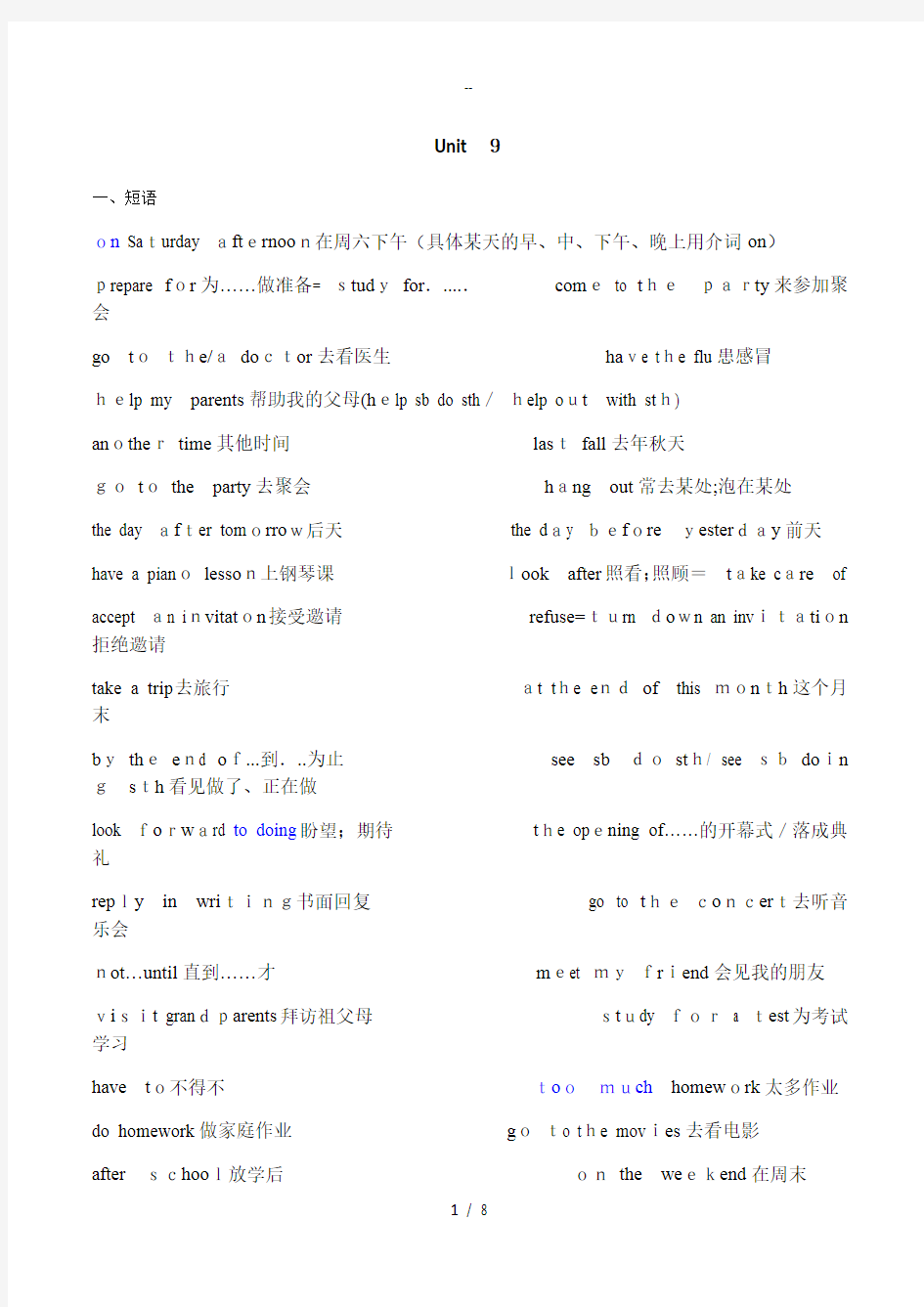

Unit 9
一、短语
on Saturday afternoon在周六下午(具体某天的早、中、下午、晚上用介词on)
prepare for为……做准备= studyfor......cometo theparty来参加聚会
go tothe/adoctor去看医生have the flu患感冒
help my parents帮助我的父母(help sb do sth/help out with sth)
anothertime其他时间lastfall去年秋天
gotothe party去聚会hang out常去某处;泡在某处
the day after tomorrow后天the day beforeyesterday前天
have a pianolesson上钢琴课look after照看;照顾=take care of
accept an invitaton接受邀请refuse=turn down an invitation 拒绝邀请
take a trip去旅行at the endof this month这个月末
bytheend of...到...为止see sbdosth/ see sbdoin gsth看见做了、正在做
look forward to doing盼望;期待the opening of……的开幕式/落成典礼
reply in writing书面回复go to theconcert去听音乐会
not…until直到……才meet myfriend会见我的朋友
visit grandparents拜访祖父母study for a test为考试学习
have to不得不toomuch homework太多作业
do homework做家庭作业goto the movies去看电影
afterschool放学后onthe weekend在周末
go bikeriding骑自行车thank you/thanks for doing感谢做......
二、语法
1.another,other,theother,others与theothers
●another指不定数目中的“另一个;又一个”,用来代替或修饰单数可数名词。如:Would
youlikeanother cup of tea?你想再来一杯茶吗?
●other意为“另外的;其他的”,修饰复数名词。如:We study Chinese,math,Engl
ish and otherlessons.我们学习语文、数学、英语和其他学科。
●theother通常指两个中的“另一个”。one…..the other…..如:Shehast
wodaughters.Oneis ateacher,the other is a doctor.她有两个女儿。一个是教师,另一个是医生。
●others泛指“另外的人或物”。the others特指某范围内“其余全部的人或物”。
2.byby+交通工具,乘坐... by在...之前by Friday
3.感叹句句型
1. What+ a / an +adj.+可数名词单数+主语+谓语+其他成分!
2. What +adj.+可数名词复数/不可数名词+主语+谓语+其他成分!
3.How + adj.+ a/ an +名词+主语+谓语+其他成分!
4.How + adj./adv.+ 主语+谓语+其他成分!
4.情态动词can 的用法小结
1).表示能力
can 与be able to 的区别
1. be able to 能用于各种时态。
2.can/ could只能表示现在或过去的能力。
2).can/could表示许可/允诺
Can you come to myparty?
肯定回答:Sure,I’d love to. 否定回答:I’m sorry I can’t./ I’d loveto but....
3).can指可能性
He can’tbe at home. Hehasgone toBeijing.
与must may , might, could /Should, ought to的区别
1.should,oughtto:按理应当,很可能
2.must:表示肯定的猜测
3.may/might:表示可能的猜测
4.can/could:表示否定或疑问的猜测
must与have to的用法区别
1)两词都是'必须'的意思,haveto表示客观的需要,must表示说话人主观上的看法,既主观上的必要。
2)have to有人称、数、时态的变化,而must只有一种形式。但must可用于间接引语中表示过去的必要或义务。
3)在否定结构中:don'thave to表示"不必"mustn't表示"禁止",
5.询问星期、日期、时间等
Whatdayisittoday/tomorrow/the dayafter tomorrow?(询问星期)It isWednesday.
What isthe date today/tomorrow/the day aftertomorrow?(询问日期)It is Nov.2nd.
What's/istoday?(询问日期和星期)ItisWednesdayNov.2nd.
What’thetime?/What timeis it?(询问时间)Itis8:00.
周一到周天:Monday,Tuesday,Wednesday, Thursday, Friday,Saturday, Sund ay
一月到十二月:January,February, March, April, June, July,August, September, October,November, December
序数词:first1st, second 2nd, third3rd,forth4th
6.发出邀请:Canyoucome to my party?/Would you liketocome tomyparty?
接受邀请:Sure/Certainly/Of course,I'dlove/like to.Yes,I'dlove/like to.
Sure..Thatsounds great.
拒绝邀请:I'm sorry,Ican't.Ihaveto/must…
Sorry,I'dlove to.But I have to…
I’mafraidnot.Ihave to/must…
拓展:向别人发出邀请、请求、建议或征求某人的意见的其他表达法:
Will/Would/Couldyoupleas+do sth?请你、、、好吗?
Shallwe+do sth?我们、、、好吗?
Let’s+dosth.让我们、、、吧!
Why not+dosth?为什么不、、、呢?
What/How about+doing?、、、怎么样?
7.形容词以-ed结尾的形容人,以-ing结尾的形容物
例如:surprise 名词,吃惊的surprised形容词,惊讶的surprising形容词,使人惊讶的
To one’ssurprise 让...吃惊的是havea surprise party举办一场惊奇的派对
8.so that 为的是,因此
so...that...如此...以致于... She is so young that shecan’t go to sc hool.
too...to...太...而不能... She istooyoung to go to school.
not...enough to 不足够.... She isnot old enough to gotoschool.
(enough+名词,足够多的...enoughmoney 足够多的钱
形容词+enough,足够.... careful enough足够仔细)
9.不定式简化宾语从句
I don’t know what to do/ how to do it.
Canyoutell mehow to plant a tree? =Canyoutell me how I can plant atree?
10.untilnot...until
until 直到... Hefinisheddoing his homework until11o’clock.
not...until 直到...才He didn’tgo to the bed until his father came back.
Unit10
一、短语
go to the party去参加聚haveagreat/good time=have fun=enjoyoneself玩得开心
stay athome待在家里take thebus乘公共汽车
tomorrow night明天晚上have a class party进行班级聚会
haveaclassmeeting开班会halfthe class一半的同学
make some food做些食物at the party在聚会上
order food from从...订购食物beangrywith/at sb.生某人的气
give sb. some advice给某人提一些建议travel aroundthe world=all over the world环游世界
make(alot of)money赚(许多)钱.getaneducation得到教育getagood education
a soccerplayer一名足球运动员keep…tooneself保守秘密
talk with sb.与某人交谈in the future在将来
beangry at/about sth.因某事生气solve aproblem解决问题answer thequestion 回答问题
run away from逃避;逃跑in half分成两半
二、重点短语
1.asksb(not)to dosth.要求某人(不)做某事
2.givesb.sth.给某人某物=givesth to sb
3.tellsb (not)to dosth.告诉某人(不)做某事
4.too…to do sth.太……而不能做某事
5.be afraid to do sth.害怕做某事be afraid of doing sth
6.advise sb(not)to do sth.劝告某人(不)做某事
advise是动词,建议advice是名词,并且是不可数名词some advice
7.It’s best (not) to dosth.最好(不)做某事
8.need to dosth.需要做某事
9.share sth. with sb.与某人分享某事
10.be upsetabout/ that....对...感到难过
三、语法
1、Ithink I’ll wear jeansto the party.
我想我将穿牛仔裤去参加聚会。
I think… 意为“我认为……”,当主语是第一人称(I或We),think表示“看法”时,其后若接否定意义的宾语从句,要否定在主句上,即I/We don’t think +肯定形式的宾语从句。
2、The students are talking aboutwhen to havea classparty.
学生们正在谈论什么时候举办班级聚会。
Whento havea class party 是“疑问词+动词不定式”结构。“疑问词+动词不定式”结构可与主从复合句进行同义句转换。
3、…let’sorderfood froma restaurant.
…咱们从饭店订购食物吧。
order及物动词,意为“订购;订货;点菜;命令”。用法如下:
① order sth.from +地点从某地订购某物
①order sb. to do sth. 命令某人做某事
5、Ifpeople have problems,they should keep them to themselves.
如果人们有问题,他们应该保守秘密。
keep…tooneself 意为“保守秘密”
The teenagers like tokeep theirproblemsto themselves.
孩子们喜欢就他们的问题保守秘密。
6、She wasafraid to tell herparents aboutit.
她害怕把这件事告诉她的父母。
Be afraid todo sth.意为害怕做某事
I am afraidto speak in class.我害怕在班上发言。
① be afraid of sth./sb.害怕某物/某人
Mysister is afraidofdogs.我妹妹害怕狗。
① I’m afraid +从句我恐怕……
I’m afraidI can’t helpyou.我恐怕不能帮你。
词语辩析:be afraid todo sth.与be afraid of doing sth.
语法(grammar)
1、if “如果;假如”,用于引导条件状语从句。if 引导的条件状语从句表示条件。含有if 引导的条件状语从句也是一个完整的句子,故一定要有主语,如果放在主句前时,从句后面要用逗号隔开;由if引导的条件状语从然用一般现在时表示将来,其主句可以使用一般将来时、含有情态动词的句子或祈使句。
If he comeshere,wewillplaytogether.=We’llplay together ifhe comes here.如果他来这时,我们就一起玩。
2、should的用法:should用作情态动词,意为应该,其后跟动词原形,用来表示义务和责任,其否定句要在should 后加not,可缩写成shouldn’t,一般疑问句要把should 提前。